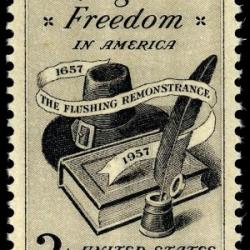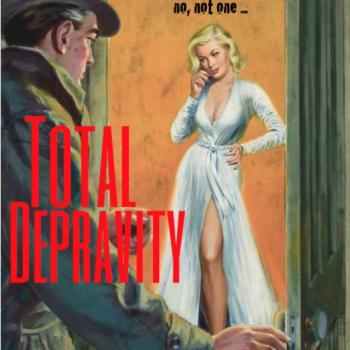Hey, did you hear what infamous lying historian David Barton said about net neutrality? He …
Wait, sorry. Who cares what a confirmed and unrepentant evil liar like David Barton says about anything?
And why would anyone think to ask him about it. Was someone sitting around thinking, “Hmmm, this business about the free flow of information on the Internet seems important, but confusing. If only we could find someone to sort it out — someone, perhaps, who has made a career out of taking historical figures out of context and fabricating quotations out of whole cloth. …”
For the record, Barton says net neutrality is “wicked stuff,” because, he says, “fairness” is anti-biblical. No, really, he said that:
Fair is a word no Christian should ever use in their vocabulary. Fair has nothing to do with anything. What you want is justice, you don’t want fairness.
The sound you hear is John Rawls spinning in his grave.
In related news, David Sehat writes about “Five myths about church and state in America,” highlighting this quote from Justice Robert H. Jackson in 1952, who seems to be anticipating the lies of confused theocrats like Barton:
My evangelistic brethren confuse an objection to compulsion with an objection to religion. It is possible to hold a faith with enough confidence that what should be rendered to God does not need to be decided and collected by Caesar.
Jamelle Bouie reports on a poll that provides further evidence of the Great Reversal, the polar flip in America’s two party system in which the Democrats became the heirs of Lincoln and the Republicans the heirs of Andrew Johnson.
“Less than half of GOP voters in Georgia, North Carolina and Mississippi are glad that the North won the Civil War,” Public Policy Polling found. The numbers: only 47 percent of Georgia Republicans are glad Lincoln won the war, only 35 percent of North Carolina Republicans and 38 percent in Mississippi.
As Bouie notes, “This is a nice illustration of the Confederate sympathy that seems to be entrenched among significant portions of Southern Republicans.”
Southern Republicans like Abraham Lincoln less than Southern Democrats do. I’ve tried before to figure out why this might be (see earlier, “The compass now points south“), but leave aside the why for now and just note, again, the strangeness of this weird reversal.
The Republican Party gave us the 13th, 14th and 15th Amendments and it gave us a federal government with the power to enforce them. Yet today, if you hear a politician railing against the powers of the federal government or complaining about enforcement of the 14th Amendment, then you know without checking that this politician is a Republican — that this politician bears the same party designation as Lincoln and Thaddeus Stevens and Charles Sumner. Strange.
– – – – – – – – –
On NPR’s “Fresh Air,” Tina Fey spoke about the danger of irony that can seem to reinforce the very prejudices it mocks:
Jokes are tricky because some of it is the context and some of it is the intention of [the person] who’s making the joke. … If you know that it’s coming from a loving place.
Tricky indeed. This subjective context — who is telling this joke, and why? — is another piece of the discussion we had earlier about Sarah Silverman and Groupon’s Super Bowl ad fail.
That intention has to be established clearly for some jokes to work. If that intention is unknown, unclear or uncertain, then a joke meant to ridicule prejudice is likely to come across, instead, as a nasty indulgence and reinforcement of that very prejudice. (Yes, Daniel Tosh, I’m looking at you.)
– – – – – – – – –
Elsewhere:
Future U.S. History Students: “It’s Pretty Embarrassing How Long You Guys Took To Legalize Gay Marriage”
Kate Sheppard: “10 Reasons to Still Be [Angry] About the BP Disaster”
At Balloon Juice, Dennis G. discusses the odious grifter Ralph Reed, whom Jack Abramoff and his criminal associate Michael Scanlon agreed was “a bad version of us.”
The Denver Post profiles the Sarcastic Lutheran.
Tim LaHaye is planning a major motion picture on “the biblical story of 10 post-resurrection appearances of Christ.” He really does seem to believe that a fictional re-enactment constitutes proof.
Michigan state Sen. Bruce Casswell is an awful, awful human being. The remarkable thing about the politics of resentment is that more often than not it focuses on the privileged resenting the powerless.
– – – – – – – – –
* The title of this post comes from Michael Chabon’s astonishing 2008 novel, The Yiddish Policemen’s Union:
“I’m weak,” Landsman says. … “I have no feel for the middle game.”
“In my experience, Detective,” Tenenboym says, “it’s all middle game.”
“Don’t I know it,” Landsman says.
My copy of that book arrived Saturday and wound up usurping much of the time I might have otherwise spent writing about some of the above items at greater length. If you’re a fan of hardboiled Chandler-esque crime stories, or of alternative histories, or of audacious yet stunningly realized exercises in world-building, or of delicious satire targeting cluelessly destructive apocalyptic prophecy enthusiasts — which is to say, if you’re like me — then I’m certain you’ll enjoy this book as much as I did.















